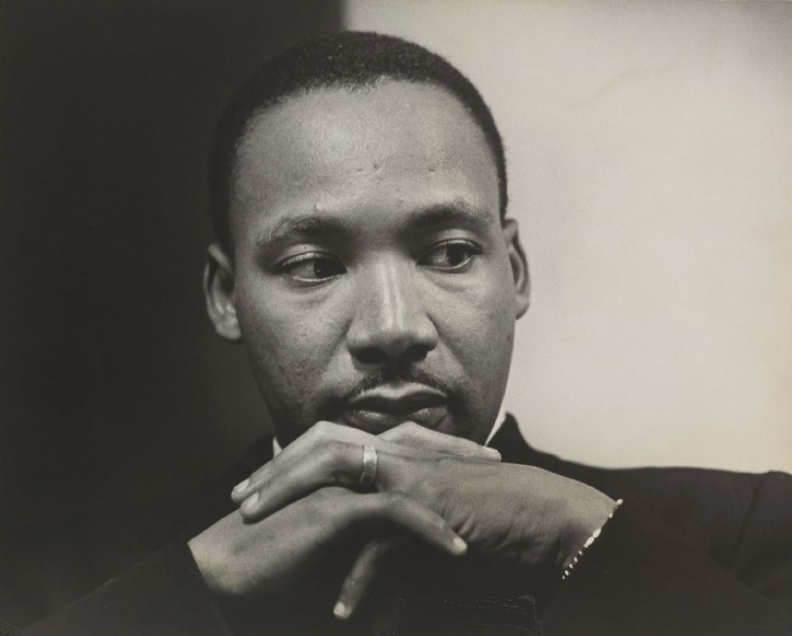My favorite King quote is something he wrote about a year before his death:
The problems of racial injustice and economic injustice cannot be solved without a radical redistribution of political and economic power.
That’s powerful stuff coming from a figure whose politics have been defanged and whitewashed into a cartoon of “peace” and “equality.”
I also try to remember that when King was assassinated, he was in Memphis, Tennessee, to support striking Black sanitation workers.
But one of my favorite King ideas is a metaphor he borrowed from a socialist Methodist pastor.
“I’m sure that many of you have had the experience of dealing with thermometers and thermostats,” King said in a sermon he gave many times early in his life.
The thermometer merely records the temperature. If it is 70 or 80 degrees, it registers that and that is all. On the other hand, the thermostat changes the temperature. If it is too cool in the house, you simply push the thermostat up a little and it makes it warmer. And so the Christian is called upon not to be like a thermometer conforming to the temperature of his society, but he must be like a thermostat serving to transform the temperature of his society.
Let’s replace “the Christian” with “humans.”
[Humans] are called upon not to be like a thermometer conforming to the temperature of society, but [they] must be like a thermostat serving to transform the temperature of society.
King was arguing that we must change society rather than only be changed by it. Which is what Karl Marx meant when he wrote, “The philosophers have only interpreted the world in various ways. The point is to change it.”
Okay, fair enough. We shouldn’t care only about ourselves. It’s our responsibility, as Bernie Sanders put it in his 2020 presidential run, “to fight for someone you don’t know.”
But it gets really interesting when you apply the metaphor to the mind.
There’s a contradiction. On the one hand, being mindful is like being a thermostat. When you realize you’re lost in thought, you bring your attention back to the present moment. When you’re worrying, planning, ruminating, you feel your breath, notice bodily sensations, listen.
Mindfulness is staying steady in the riptide of thoughts. Resting in the center of your experience, at a comfortable temperature of 72 degrees.
But King’s whole point was that we must act. It is our responsibility to change the things that must be changed.
If mindfulness is about staying still with whatever comes up, wouldn’t that make trying to change the world unmindful?
No, because we’re a thermostat. Sometimes, a comfortable 72 degrees isn’t what’s called for. We need to turn up the heat. We need to protest, march, strike. Throw ourselves in the gears of the system.
What’s unmindful—or unwise—is trying to do it all by ourselves. We’re like a teenager complaining about the temperature but lacking the money to pay the heating bill.
That’s a recipe for suffering. As Buddhism’s second noble truth says, suffering comes from grasping on to things we like and pushing away things we don’t like. Wanting to change things that can’t be changed.
Like a furnace in a house, we need resources to turn up the temperature. We need help. We need each other.
That’s what King meant by “a radical redistribution of political and economic power.”
I’m pretty sure you don’t have the wealth of Jeff Bezos or Donald Trump. The 1 percent can change the temperature themselves (and they literally are heating up the planet with their outsized consumption).
But we’re the 99 percent, everyone else. If we’re organized—our power—we can turn up the heat when it’s called for. If we can get past our differences—that were created by the 1 percent, like the concept of race—we can change this society.
I’ll let King have the last word:
Injustice anywhere is a threat to justice everywhere. We are caught in an inescapable network of mutuality, tied in a single garment of destiny. Whatever affects one directly, affects all indirectly.
I’m a writer, meditation teacher, and host of the Meditation for the 99% podcast. My weekly email newsletter helps you bring mindfulness to work, relationships, and politics. Subscribe here.
Download my free ebook on how meditation transformed my life.
